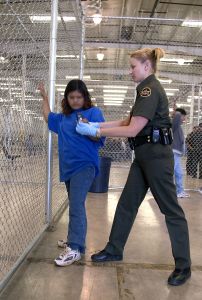“My youngest client who was not in immigration court with a parent was six years old.”
David Bennion is a Philadelphia-based immigration attorney who specializes in fighting to keep families together in the United States. He especially works with unaccompanied youth who travel to the United States to seek safety.
“Right now I am representing several children from maybe 10 to 17 [years old],” Bennion said.
Children as young as 3 are crossing the border to reach the United States to find their parent(s) that may have abandoned them or to try and find work so they can send money home to their family.

According to the Department of Homeland Security, approximately 50,000 children were captured at the United States-Mexico border by the end of 2014. That number continues to climb. The children are transferred to detention centers or sometimes with a family member who is already in the United States, where they wait until their deportation hearings.
Undocumented persons, children included, are not entitled to a lawyer under the United States law. It is up to the child or a family member to find them a lawyer to represent them in court.
“It can be tricky sometimes [representing a child in court] because most of the time the child’s interests and the parent’s interests are aligned but not always. If I am representing the child, but the child is still under the legal caring custody of their parents, then that can be a little bit tricky,” Bennion said.
Preparing to represent a child in court comes with its challenges. In most cases, the children have suffered from physical, emotional and mental abuse from family members from their homes, gang members or even from the journey to get to the United States.
“It can be harder to get the information that you need from a child in order to present their case because they are a child and depending on how old they are they might not really understand what is going on. They might not even necessarily understand what I am trying to ask or communicate to them,” Bennion said.
According to Bennion, undocumented children can only plea for certain statuses to the courts if they want to stay in the United States.
“When it comes to child cases I am dealing with, there are mainly two types of cases. One is called Special Immigrant Juvenile Status, and that is the simpler of the other, while the other is Asylum, which can be more complicated,” Bennion said. “Special Juvenile Status is when the child does not live with one of their parents, maybe the child does not live with either parent or only one parent. If [the child has a family member in a state then] a state family court will grant either the parent or sibling or aunt or uncle custody of the child. With that custody order, we could usually get a green card [for the child].”
This only occurs if the lawyer and child present a good case. The courts follow the law thoroughly when it comes to an immigration case.
One of the most recent immigration arguments is if a young undocumented child can represent himself or herself in court without any lawyer present.
One judge from Seattle, Washington, Jack H. Weil, has argued that people can train children as young as 3 and 4-years-old to represent themselves in court. He says and believes that it can be doable and that it will result to a “fair hearing.”
Experts in psychology and other officials have argued against Weil.
“Three and 4-year-olds do not yet have logical reasoning abilities. It’s preposterous, frankly, to think they could be taught enough about immigration law to be able to represent themselves in court,” Laurence Steinberb, psychology professor at Temple University, said to The Washington Post.
As a lawyer, Bennion tries his hardest to keep advocating in public and fighting in court to win his cases for his undocumented children clients. Bennion has found that The Department of Justice rushes and does not take into consideration all of the facts of a child’s case and the chances of winning are slim.
“In Philly where we are fortunate to have a judge who is very responsible and fair, has taken on the entire juvenile docket. He has managed that docket in a way that I think in general has remained due process for those kids and that is not the case for all immigration courts elsewhere,” Bennion said.



